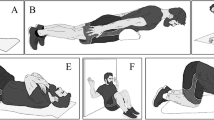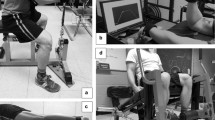Summary
Routine measurements of muscle strength capabilities commonly use external dynamometers against which the subject exerts maximal voluntary contractions of muscles in static (isometric) tests. These tests require active cooperation of the subject, i.e., full motivation to “give the best”. At present, no practicable techniques exist that provide objective clues indicating that indeed a maximal effort is delivered, or if only a portion of the available strength is exerted. This paper describes experiments performed with 30 subjects which indicate that the rate of strength build-up in repeated exertions may provide objective criteria to judge whether or not a subject exerts full muscular strength in a routine test.
Similar content being viewed by others
References
Astrand PO, Rodahl K (1977) Textbook of work physiology, 2nd edn. McGraw-Hill, New York
Beck W, Hettinger T (1956) Ist die Bewertung von Kraftmessungen bei der Begutachtung sinnvoll? Monatsschr Unfallheilk Versicher Versorg Verkehrsmed 59: 116–118
Caldwell LS, Chaffin DB, Dukes-Dobos FN, Kroemer KHE, Laubach LL, Snook SH, Wasserman DE (1974) A proposed standard procedure for static muscle strength testing. Am Ind Hyg Assoc J 35: 201–206
Houk JC (1979) Regulation of stiffness by skeletomotor reflexes. Ann Rev Physiol 41: 99–114
Hyvareinen J, Komi PV, Puhakka P (1977) Endurance of muscle contraction under hypnosis. Acta Physiol Scand 100: 485–487
Kroemer KHE (1970) Human strength. Terminology, measurement and interpretation of data. Hum Factors 12: 297–313
Kroemer KHE (1974) Designing for muscular strength of various populations. Aerospace Medical Research Laboratory, Wright-Patterson AFB, OH
Kroemer KHE (1974) Ergonomie im Zusammenhang mit der Sicherheit am Arbeitsplatz. Sichere Arbeit 27: 5–12
Kroemer KHE (1975) Muscle strength as a criterion in control design for diverse populations. In: Chapanis A (ed) Ethnic variables in human factors engineering. Hopkins University Press, Baltimore, pp 67–89
Kroemer KHE (1977) Die Messung der MuskelstÄrke des Menschen. (Forschungsbericht 161) Bundesanstalt für Arbeitsschutz und Unfallforschung, Dortmund
Kroemer KHE (1978) The assessment of human strength. In: Drury CG (ed) Safety in manual materials handling. DHEW (NIOSH) No. 78-185, US Government Printing Office, Washington, DC, pp 39–45
Kroemer KHE (1979) A new model of muscle strength regulation. Annual Conference of the Human Factors Society, Santa Monica (Proceedings: 19–20)
Kroemer KHE, Marras WS (1980) Objective assessment of the “maximal voluntary contraction in human muscle strength measurements”. Department of Industrial Engineering. Wayne State University, Detroit
Marras WS (1978) Tests to distinguish between “true” and “faked” maximum muscle strength exertions. Master's Thesis, Department of Industrial Engineering and Operations Research. Wayne State University, Detroit
Marras WS, Kroemer KHE (1979) Evaluation of controlled static muscle exertions. Department of Industrial Engineering. Wayne State University, Detroit
Maton B (1976) Motor unit differentiation and integrated surface EMG in voluntary isometric contraction. Eur J Appl Physiol 38: 149–157
Rohmert W, Sieber W (1960) Untersuchungen über die Bewertung von Kraftmessungen bei der medizinischen Begutachtung“. Med Sachverstaend 56: 174–1977
Author information
Authors and Affiliations
Rights and permissions
About this article
Cite this article
Kroemer, K.H.E., Marras, W.S. Towards an objective assessment of the “maximal voluntary contraction” component in routine muscle strength measurements. Europ. J. Appl. Physiol. 45, 1–9 (1980). https://doi.org/10.1007/BF00421195
Accepted:
Issue Date:
DOI: https://doi.org/10.1007/BF00421195




